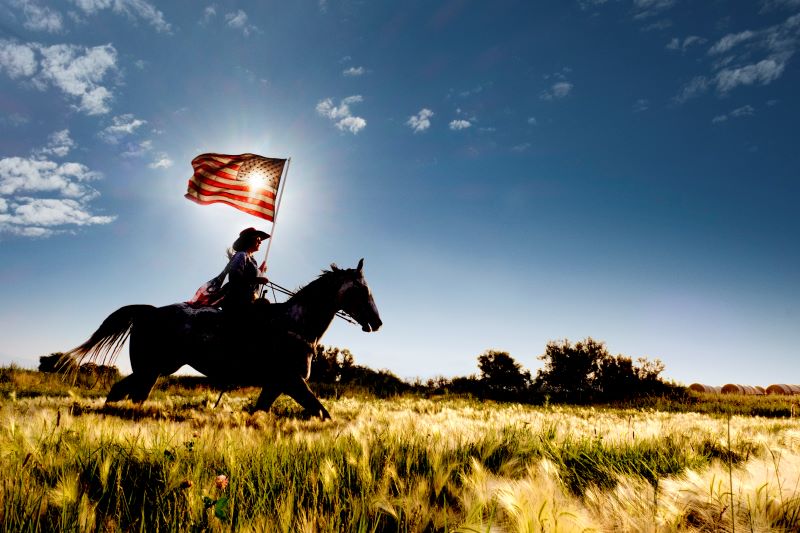The Lesson of Liberty in American Slavery
Sign up for a six month free
trial of The Stand Magazine!
I recently watched the movie Harriet about the black Moses, one of the most courageous women in American history. The movie is powerful, and I recommend it.
It shows the desperate dependence of plantation owners on the institution of slavery for their economic survival and societal status. It portrays the extraordinary cohesiveness of slave families. It touches on the ability of slaves to wear one mask for the masters and one for trusted family and friends. It also shows that some slaves, like Harriet Tubman, risked everything for liberty.
Those who struck out for freedom faced beatings, torture, mutilation or being “sold down the river” to a worse situation. When Harriet made her first return trip south to free her family, her husband, believing she was dead, had married another woman. He said to her, “You left me. You went alone and left me.” There it is. In the end, the will to be free is a personal choice. They had planned to leave together, but he was stopped. Those who tried to recapture her thought she was killed when she jumped into a raging river.
Why did Harriet keep running, despite having to leave her husband behind? She gave the answer later in the story when she confronted her former master during her final Underground Railroad journey. Claiming that she had been treated well, he implored, “You could have stayed with us.” She retorted, “I reasoned that there was one of two things I had a right to: liberty or death.” She was determined to be free even if it cost her life.
Given the history of Americans of slave descent, it is ironic that most today have allied themselves to a Democrat Party whose policies amount to a modern form of slavery. It offers guaranteed minimal subsistence and perennial treatment as an inferior victim. It aborts their babies, disintegrates their families, denies their children a quality education. And yet, a recent Harvard/Yale study showed that liberals condescend to them as inferiors lacking intelligence.
In one of the film’s scenes, when Harriet tells a black Underground Railroad colleague that she wants to return south to rescue her family, he admonishes her, “Rescuing slaves requires skill and careful planning.” After pointing out that she could not read signs or maps, he concluded, “There’s nothing more you can do.” In a flash of anger, she replies, “Don’t tell me what I can’t do. I made it this far on my own...So don’t you tell me what I can’t do. You don’t know me.” She returned to the south on the first of many journeys to rescue slaves. Harriet Tubman was a woman of God who refused to allow herself to be held back by the well-meaning expectations of friends or vicious threats of enemies. She believed that God had something better for her, and she set out to pursue it.
While I never faced the life or death struggle of Tubman, I can relate to her frustration with others trying to set limitations on her dreams. When I was about to apply to Harvard Law School in 1974, my liberal college professors told me not to get my hopes up about going to Harvard because “black people don’t score well on standardized tests.” They reasoned that the Law School Admissions Test (“LSAT”) was “culturally biased” to advantage “white” people. I thought this was one of the most ridiculous things I ever heard. I had been taking such tests all my life and never detected any bias.
While I did not express my vehement disagreement, I was screaming on the inside, “Don’t you tell me what I can’t do! You don’t know me!” I was not raised to be a victim. I was not taught to lower my expectations and ambitions to conform to how others saw me. It was a vision for her future that liberated Miss Tubman. She was not about to let obsession with the past hold her back.
I was taught by my father that my future would be what I choose to make it. I was an A student in college and graduated Phi Beta Kappa and Summa Cum Laude. I did quite well on the LSAT’s, without the lowered standards of race norming which rob black people of what can only be earned - respect. I was accepted to Harvard, Yale, University of Virginia, Columbia, Berkeley and every other school to which I applied.
Sadly, many in the black community have internalized the limitations the Democrat Party’s philosophy has placed upon them. The liberal orthodoxy of dependence and inferiority has its rewards. If you will nod approvingly at the mass killing of black babies limiting the growth of your population through abortion, you might get paid off by Planned Parenthood. They might even help get you elected to office.
If you will go along with the gender-bending confusion which puts more destructive pressure on the black family, you might become a favorite of Hollywood or a talking head for the mainstream media. If you will use racism to explain every problem confronting every black American, you might get a job as an overseer on the Democratic Plantation.
My professors did not see me as an individual. They condemned me to the inevitable outcomes they ascribed to a group. I am not a group. I am an individual. Harriet Tubman was not a group. She saw herself as an individual capable of making personal choices for her own life, even in horrendous circumstances that no American faces today. It was right for people to band together in the Civil Rights Movement to remove racial discrimination, but each individual must make the most of the resulting opportunities. In a free society, success is based on personal values and behavior, not collective identity and entitlement.
Americans of African and slave descent should be the most passionate about individual liberty. It is not found in a subsistence existence or collective racial identity. Collectivist ideologies such as Marxism, socialism, and communism are systems of slavery and enemies of freedom. Identity politics is a psychological prison. Freedom is not found in what you can demand of others. Its wellspring is what you demand of yourself. Its fulfillment is in the God-given right to conform to your own expectations.
Harriet Tubman became a free woman while others languished in bondage waiting for collective liberation to come. She led others to freedom because she dared challenge that orthodoxy and inspired others to do the same. Black conservatives are the Moses of today, and every American of every background, young and old, should join us in rejecting collectivist bondage and embracing the promised land of individual liberty.
Bishop E.W. Jackson is a Marine Corps veteran, a graduate of Harvard Law School ‘78, retired attorney, Pastor of The Called Church, President of STAND Foundation (standamerica.us) and host for “The Awakening” on American Family Radio (AFR.net)

Sign up for a free six-month trial of
The Stand Magazine!
Sign up for free to receive notable blogs delivered to your email weekly.


















